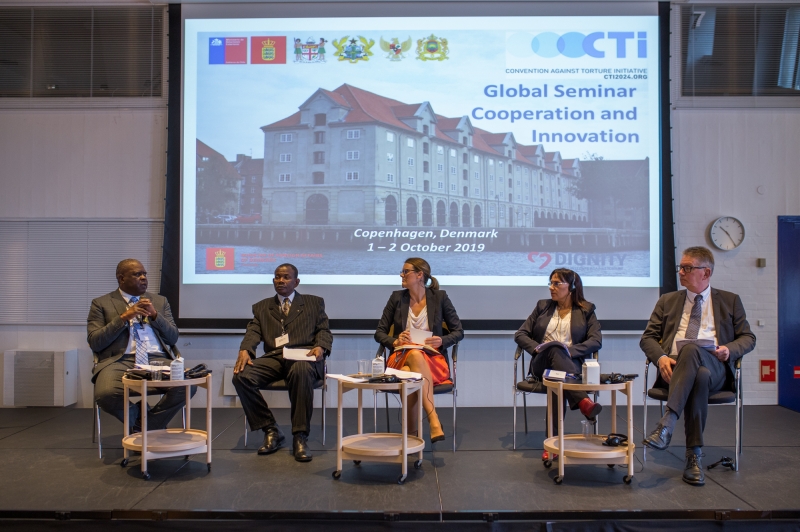Innovation and Cooperation: Police gather in Copenhagen from around the world
Copenhagen, Denmark, 2 October 2019:
This week, on 1-2 October, the Danish Ministry of Foreign Affairs hosted a two-day major cross-regional seminar on cooperation and innovation in policing and law enforcement, as part of the Convention on Torture Initiative’s (CTI) global goal to reduce the risks of torture and ill-treatment worldwide. The high level seminar brought together senior police officers, many at the rank of national Police Commissioner or Director of the country’s national police academy, from 23 countries, alongside leading experts in psychology, neuroscience, interviewing, and torture prevention.

At the forefront of moderated discussions, representatives shared experiences, best practices and challenges in solidifying regulatory frameworks, integrating training and education, expanding transparency, monitoring and evaluation, and applying evidence-based investigative interviewing methods. In all areas, participants emphasised the important foundational principles of the UN Convention against Torture and Other Cruel, Inhuman or Degrading Treatment or Punishment (UNCAT), and discussed how these principles are best operationalised for the purposes of fair criminal investigations.
A live simulation, re-enacting a rapport-building interview and the strategic release of evidence to a suspect, was one of the many highpoints of the event. The role play showed how such methods are transferable to other jurisdictions, taking into account the need to adapt aspects according to different legal systems and regulatory frameworks.
Also highlighted were the key ways research and evidence have been pivotal to strategies of police professionalism in a number of countries, not only resulting in real reductions in complaints against officers, but equally in improving prosecution and conviction rates, and keeping communities safer. Despite its persistent use in some systems, scientific research has proven the ineffectiveness of not only torture and ill-treatment, but also other forms of coercion and intimidation, to retrieving reliable evidence or information. The impairment to brain function and recollection caused by the imposition of stressors (such as anxiety-producing coercion or intimidation, sensory deprivation, or infliction of pain) in fact produces the opposite effect, according to experts, Professor Shane O’Mara, Professor of Experimental Brain Research at Trinity College’s Institute of Neuroscience in Ireland and Professor Raymond Bull, Professor of Criminal Investigation at University of Derby in the United Kingdom.
Examples were given of the long association between psychologists and police to help guide recruitment practices, as well as effective rapport-building interviewing techniques, and they heard about new joint ventures between police and academic institutions in a range of countries.
Recognising the positive contributions of neuroscience and psychology to law enforcement practices, and operational training, participants sought greater engagement, cooperation and knowledge transfer and education, with a focus on the need for operational-focused training.
The event was closed by H.E. Jeppe Kofod, the Minister of Foreign Affairs of Denmark, as host and CTI Core State, who spoke about the progress being made by the coalition of CTI Core States of Chile, Denmark, Fiji, Ghana, Indonesia and Morocco, including through such technical and capacity-building seminars, to drive a torture-free world. Keynote addresses were given by the Hon. Abubacarr Tambadou, Minister of Justice and Attorney General of The Gambia, who told the compelling story of his country and the very significant reforms being undertaken to repair and reconcile after years of oppression and torture, and reminding those present why the fight against torture and ill-treatment is a real one. The second keynote address was delivered by Mr. Andrew Gilmour, the UN’s Assistant Secretary General for Human Rights, sharing the UN’s take on challenges and progress. The two-day event was facilitated by Dr. Alice Edwards, Head of the CTI Secretariat.
The Seminar booklet is available here in English, French and Spanish.

